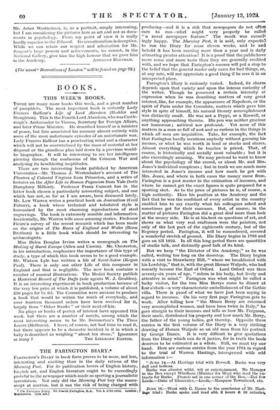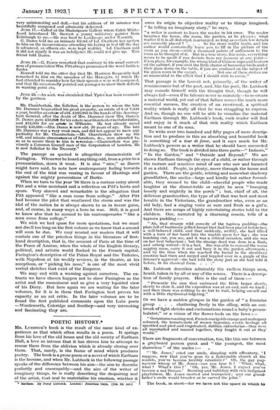THE FARINGTON DIARY.* FAiuNcTores DIARY in book form proves to
be more, not less, interesting and exciting than in the daily rations of the Morning Post. For its publication lovers of English history, Emzlish art, and English literature ought to be exceedingly grateful to the newspaper which made so sporting a journalistic speculation. Not only did the Morning Post buy the manu- script at auction, but it ran the risk of being charged with
• Th. Faringion Diary, By Immix Faringtop. R.A. VoL L 1793-1802. Loudon notehInson. [21a. net.] producing—and it is a risk that newspapers do not often care to run—what might very properly be calla)
" a novel newspaper feature." The result was exceeas ingly happy. The Morning Post, it is said, only expectiO to run the Diary for some eleven weeks, and lo and behold it has been running more than a year and is daily attracting greater attention I It is a proof that the public have more sense and more taste than they are generally credited with, and we hope that Farington's success will put a stop to the belief that the general reader only cares for bad things, or, at any rate, will not appreciate a good thing if he sees it in an unexpected place.
Farington's Diary is curiously varied. Indeed, its charm depends upon that variety and upon the intense curiosity of the writer. Though he possessed a certain intensity of expression when he was describing matters of very great interest, like, for example, the appearance of Napoleon, or the spirit of Paris under the Consulate, matters which gave him style in spite of himself, his natural literary accomplishment was distinctly small. He was not a Pepys, or a Boswell, or anything approaching thereto. His pen was neither gracious nor humorous ; satirical nor profound. Yet none of this matters in a man so full of zest and so curious in the things in which all men are inquisitive. Take, for example, the fact that Farington hardly mentions anybody without guessing his income, or what he was worth in land or stocks and shares.
Almost everything which he touches is priced. That, of course, is historically and socially most valuable ; but it is also exceedingly amusing. We may pretend to want to know about the psychology of the crowd, or about Mr. and Mrs.
Jones's individual complexes ; but in truth we are much more interested in Jones's income and how much he got with Mrs. Jones, and where in both cases the money came from. Farington is a past master in the estimation of incomes, and where he cannot get the exact figures is quite prepared for a sporting shot. As to the price of pictures he is, of course, a high authority. Here his position at the Academy and the fact that he was the confidant of every artist in the country enabled him to say exactly what his colleagues asked and sometimes got for their canvases. But, of course, in the matter of pictures Farington did a great deal more than look at the money side. He -is at his. best on questions of art, and shows us what very real craftsmen were the painters, not only of the last part of the eighteenth century, but of the Regency period. Farington, it will be remembered, covered a wonderful stretch of ground. His Diary begins in 1793 and goes on till 1822. In all this long period there are quantities of studio talk, and distinctly good talk of its kind.
But we keep " the Dictator of the Academy," as he was called, waiting too long on the doorstep. The Diary begins with a visit to Strawberry Hill, " where we breakfasted with his Lordship," that is, with the great Horace Walpole, who had recently become the Earl of Orford. Lord Orford was then seventy-six years of age, " infirm in his body, but lively and attentive in mind." Farington was what might be called a lucky visitor, for the two Miss Berrys came to dinner at four o'clock—a very characteristic embellishment of the Gothic villa. There is proof of what we have just been saying in regard to incomes. On his very first page Farington gets to work. After telling how " the Misses Berry are esteemed very accomplished women, and have been twice in Italy," he goes straight to their incomes and tells us how Mr. Ferguson, their uncle, distributed his property and how much Mr. Berry, the father of the young ladies, got thereby. Opposite these entries in the first volume of the Diary is a very striking drawing of Horace Walpole as an old man from his portrait by George Dance. It is very difficult to give quotations from the Diary which can do it justice, for in truth the boole deserves to be estimated as a whole. Still, we must try our hand. Here are curious entries from the year 1794 in regard to the trial of Warren Hastings, interspersed with odd information :-
" Awn 14.—At Hastings trial with Bocwell. Burke was very dull and tedious.
Burke was abusive witht. wit or entertainment No Manager in the Box except Windham (Minister for War) who read the ex- tracts for Burke. Francis sat in one corner of the Box.—But few Lords.—Duke of Gloucester,—Leeds.—Marquess Townshend, etc.
• • • • JUNE 16.—Went with G. Dance to the conclusion of Mr. Hast- ings trial : Burke spoke and read abt. 2 hours & 10 minutes, very uninteresting and dull.—but his address of 10 minutes was beautifully composed and admirably delivered.
JUNE 17.—Called at the Shakespeare Gallery where Caleb White- foord introduced Mr. Stewart a young miniature painter from Edinburgh to me.—lie was bred to Landscape under Nasmith. G. Dance told me an intimate friend of IA Chatham has spoken to him on the inconvenience attending his laying in bed till the day Is advanced, as officers etc. were kept waiting. Ld. Chatham said It did not signify it was an indulgence He could not give up. This friend told Dance.
. . . . . .
Jura: 19.—G. Dance remarked that contrary to his usual correct- ness of pronunciation Wm. Pitt always pronounced the word further, furder.
Boswell told me the other day that Mr. Hastings frequently had
remarked to hhrf on the speeches of the Managers, to which He . had attended to consider how far their speeches were well composed, and that He occasionally pointed out passages to show their defects in wanting point etc.
. . . . . .
JUNE 28.—An acct. was circulated that Ypres has been evacuate by the garrison.
. . . . . . .
Mr. Chamberlain, the Solicitor, is the person to whom the late Mr. Dummer bequeathed his great property, an estate of 0 or 7,000 a year, besides an estate of abt. £100,000 in the hands of the Accomp- tant General, after the death of Mrs. Dummer (now Mrs. Dance). N. Dance gave £30,000 for his estate near Dorchester in Oxfordshire, and £12,000 for an estate in Wiltshire. He has already saved nearly £50,000.—Mrs. Dance is now abt. 50 years of age. 'rile late Mr. Dummer was a very weak man, and did not appear to have any partiality for Mr. Chamberlain.—Mr. Chamberlain drew up the will, and minute circumstances of furniture, &c., were attended to, so as to secure them to him in seversion.—Chamberlain was pre- viously a Common Council man of the Corporation of London. He is now Solicitor to the Treasury."
The passage as quoted is altogether characteristic of Farington. Whenever he heard any thing odd, from a price to a pronunciation, down it went. It is also " nice," as Bacon
might have said, to note how contemporary feeling towards the end of the trial was veering in favour of Hastings and against the mighty persecutions of Burke.
When we turn to the year '90 there is a curious entry about Pitt and a wine merchant and a reflection on Pitt's boots and spurs. Very shrewd and remarkable is the allegation that Pitt appeared " like a man come from college." After Pitt had become the pilot that weathered the storm and was the idol of the nation he is always shown to us in heroic guise, and, of course, in many ways a hero he was. Still, it is good to know also that he seemed to his contemporaries " like a man come from college."
We wish we had space for more quotations, but we must not dwell too long on the first volume as we know that a second will soon be due. We may remind our readers that it will contain one of the priceless things in the literature of first- hand description, that is, the account of Paris at the time of the Peace of Amiens, when the whole of the English literary, political, and artistic world flocked to the French capital.
Farington's description of the Palais Royal and the Tuileries, with Napoleon at his weekly reviews, in the theatre, at his receptions, or " picking his nose," is one of the most vivid verbal sketches that exist of the Emperor.
We may end with a warning against ourselves. The ex- tracts we have chosen happen not to show Farington as the artist and the connoisseur and so give a very lopsided view of his Diary. .But here again we are waiting for the later volumes, for it is in them that Farington best proves his capacity as an art critic. In the later volumes are to be found the first published comments upon the Lake poets —Wordsworth, Coleridge and Southey—and very interesting and fascinating they are.















































 Previous page
Previous page